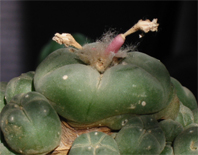As mentioned in two previous posts (available here and here) this winter was extremely cold and killed off large parts of the collection I grow in an unheated greenhouse. Now spring is comming and the surviving plants are getting ready to move on.
Lophophora williamsii var. echinata with fruit
Most of my Trans-Pecos peyote plants (Pecos River area, Val Verde County, Texas; JJH 8608293) made it through the winter and is now setting fruit as if to herald the beginning of the comming growing season. If you look closely you’ll even notice a few flower buds.
Trans-Pecos peyote with budding flower
The Trans-Pecos peyote is also known as Lophophora williamsii var. echinata and is more cold-hardy than other varieties of L. williamsii
My Epithelantha micromeris plants (near Belen, New Mexico; SB1327) are also busy securing the next generation.
Epithelantha micromeris with fruit, top view
I’m getting increasingly infatuated with Epithelantha - you can’t but love the complex spination and the almost shocking pink fruits ;-) As Epithelantha has also proven to be an extremely cold hardy genus I’ll probably add more of these plants to my collection in the future.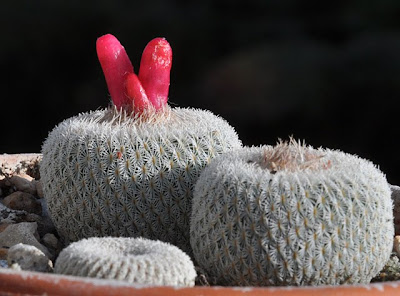
Epithelantha micromeris with fruit
I am growing these plants at my summerhouse and not seeing them as often as I could wish. Unfortunately this also means that I miss a lot of the flowers including those of the Normanbokea valdeziana and Acharagma roseana pictured below.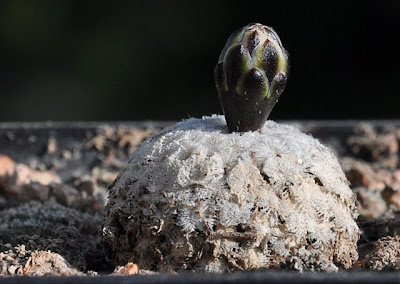
Normanbokea valdeziana about to flower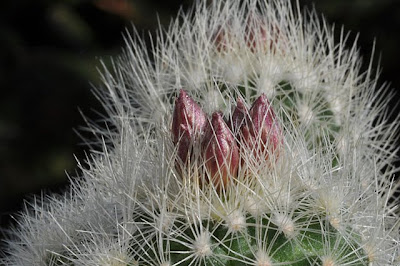
Acharagma roseana about to flower
Fortunately fruits are more persistent than flowers giving me the opportunity to enjoy sights like the orange-red berries of Escobaria missouriensis (Mesa County, Colorado; SB204)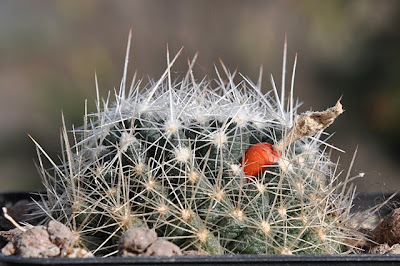
Escobaria missouriensis with fruit
My Maihuenia patagonica are thriving after the winter but not exactly flowering or setting fruit. I don’t have much experience growing Maihuenia - I originally fell for Maihuenia poeppigii but being a completist I ordered M. patagonica seeds as well. All the M. poeppigii plants succumbed to the frost this winter while the M. patagonica plants only suffered a few casualties. I'm not sure I’m treating the plants right, though, as they are growing strangely lanky, far from the dense, clustering habit I have seen in pictures (and the plants are getting plenty of light).
Maihuenia patagonica
And now for something completely different.
My summerhouse is located on the west coast of Denmark overlooking the North Sea. This weekend the Sun set in a sky looking much more orange than usual, and slightly diffused as by a thin haze. 
The Sun setting in a haze of ashes from the Eyjafjallajökull eruptions
I take this to be caused by the Eyjafjallajökull volcano eruptions that have been sending a vast, invisible plume of grit drifting over Europe and kept most of European airspace shut down for several days. Of course one could imagine that a sunset like this was caused by a thin layer of clouds, but I have enjoyed hundreds of sunsets from my terrace and never seen anything like this before.
Sunset with a diffuse halo of refracted light – probably caused by Eyjafjallajökull ashes
On a different note, the Eyjafjallajökull volcano eruptions almost got me stuck in Amsterdam (not the worst place to be stuck in, by any means ;-) I and a colleague were supposed to have flown home in the late evening of April 15, 2010 – but as we watched more and more flights getting canceled and increasing parts of the north-western European airspace being closed down we agreed to rent a car. So in the early afternoon we set out on a long drive home – which in hindsight was an extremely wise decision as Danish airspace is only opening again today ;-)
Mitteilungen der Deutschen dendrologischen gesellschaft. 1924 (added:
01/12/2026)
-
*By:*
Deutsche Dendrologische Gesellschaft
*Publication Info:*
Wendisch-Wilmersdorf; [etc.] Thyrow (Kr. Teltow), [etc.]
*Call Number:*
QK1 .D49
*Contributing...
4 weeks ago










